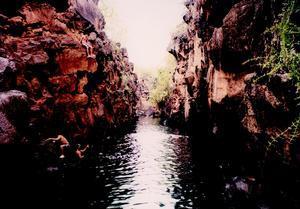The animals were left bleeding on a beach on San Cristobal Island, not far from town. Someone rang the Park anonymously to tip off the Park rangers but by the time they had arrived there was little they could do with the limited medical resources on the island.
There are rumours a San Cristobal resident was paid to remove the organs, which will apparently be sold-on in South East Asia as supposed aphrodisiacs. People living all over the island are furious, and there was a huge march through my town, Puerto Ayora, to protest against the killings. The Park is offering $2000 for information but unless someone comes forward with a tip-off the bad guys are unlikely to be caught.
The Park has been more successful nailing baddies out at sea. Six illegal fishing vessels were caught in the reserve's protected water in July alone. One had more than 600 shark fins on board. This sounds like good news until you know that the Park saw nine other vessels but could not catch them. Who knows how many boats are left unspotted.
When I returned from Isabella last month the acting Park director was nowhere to be found. He travels a lot, so I assumed he was away from the islands on business. Slowly, however, I pieced together the story that had forced him to resign.
He had had a long-standing feud with a deputy from the government on Quito. She'd been hounding him about some shady deals he'd signed in the normal director's absence.
He'd allegedly awarded the contracts for the Park uniforms to a company owned by his father-in-law. It was rumoured to be a good price, but still the deal cast the acting director in bad light.
On top of this he had renewed an agreement that gave the Park exclusive rights to train guides who work in the Galapagos. What's wrong with that you may ask? Well, it was also rumoured that the training agreement carried a clause forcing guides to wear a special uniform. You can guess which company supplied these approved uniforms.
My own work plans were shaken to the root this month. I started working on the plant study I described last month. However, I soon found out it was not that easy. The people at the Charles Darwin Research Station were complaining that they didn't have the time to give the support I was obviously going to need. The team seemed a difficult bunch to work with anyway – struggling to deal with their own competitive rivalries and communication problems.
On top of this a picture crystallised in my mind of the reality of the project. My preparatory fieldwork showed me just how dull collecting, pressing drying and classifying hundreds of plants – week in, week out, for months on end – would be.
So I took the bold move of telling the new acting director at the Park that I wouldn't be going ahead with the project. They took the news surprisingly well – suggesting to me they were quite relieved at my decision.
So, just as I thought my two 'specialised subjects' for an appearance on Mastermind would be plants and birds I've switched to something completely different. Now I'm working on the Park's recycling project.
Despite having a collection system covering all of Santa Cruz and a separation-cum-cleaning centre of town in the highlands, this project is appallingly under-managed. I don't understand how they ever got off the ground.
They collect waste plastics, glass, paper and cardboard: then sort and shed the plastics, and prepare all but the glass for shipping to the continent. Once there, no one really knows what happens to the material.
The separation and collection centre also compiles figures each month for the weight of the material they collect. This information isn't organised in way that anyone can use, however, so part of my job is to sort this out.
I'm also working on raising awareness and education, by getting people to be more responsible and hopefully leading to more recycling facilities.
My other big domestic change has been moving into my new house. You'll remember that my housemate let my room to someone else while I was away in Isabella. Well, I told this bitter story of woe to some friends and they said they had a spare room in the house they were sharing.
So now I'm sharing with a British and a Spanish girl. This house also has walls all the way up to the ceiling, although sadly it has no geckos or glass in the windows.
Source
Building Sustainable Design
Postscript
Dr Jason Palmer, Santa Cruz, Galapagos




















